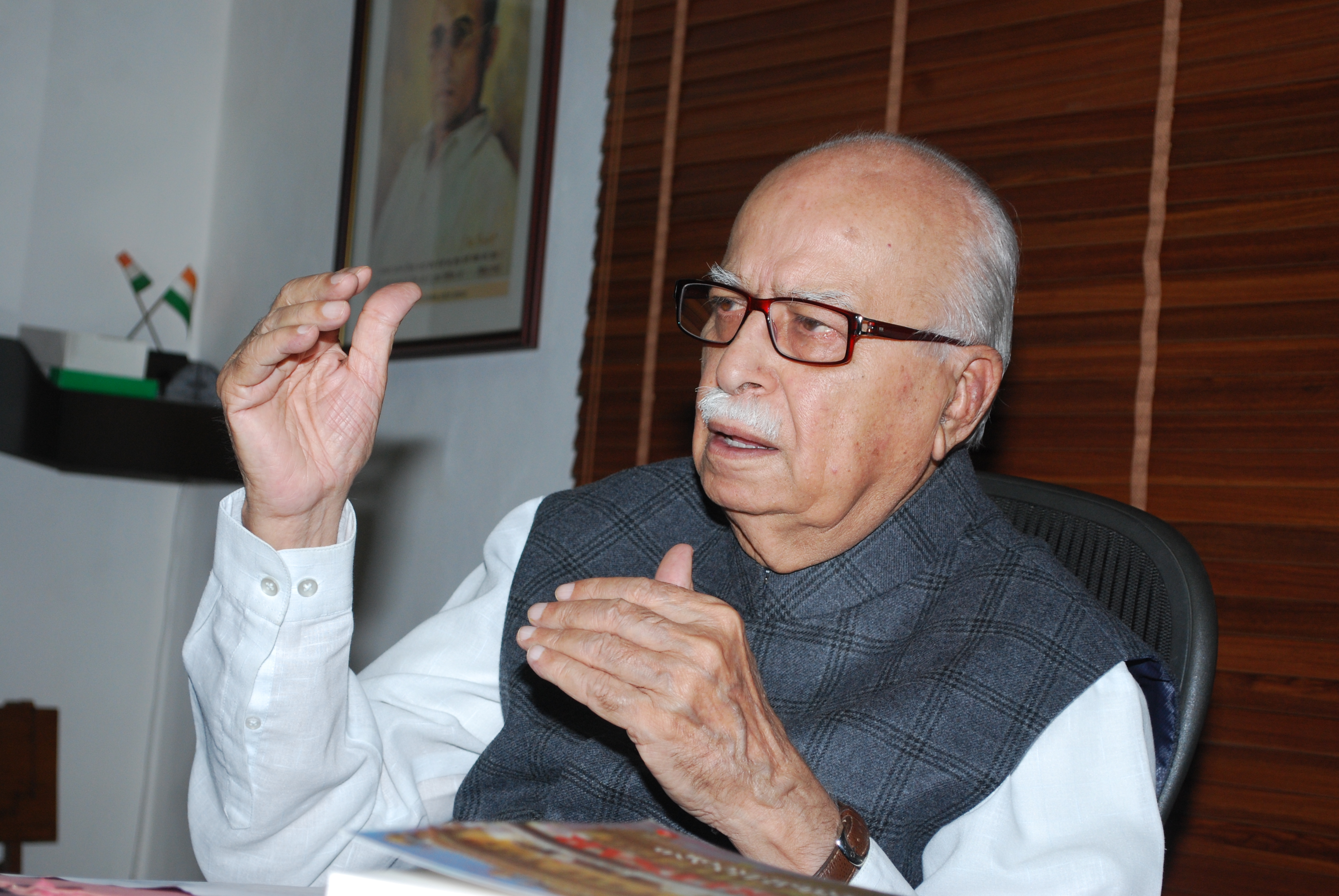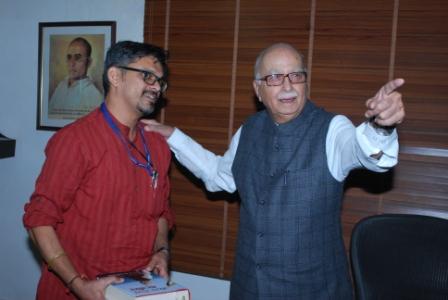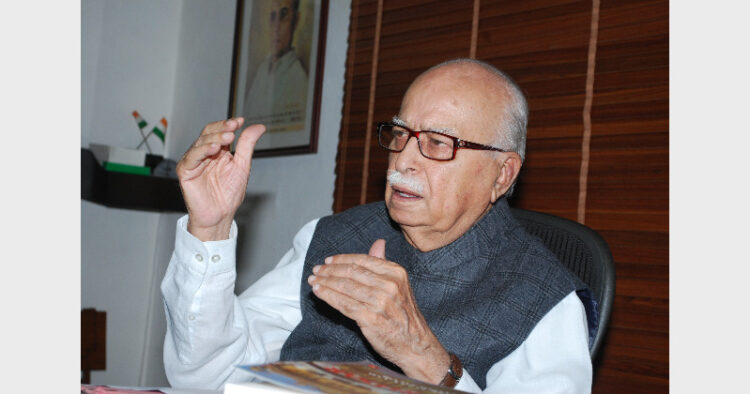
Lal Krishna Advani was born in Karachi and became RSS Swayamsevak in 1942. He became a Pracharak in the pre-Independence period and was assigned with full-time work in Rajasthan. After joining the political activities of Bharatiya Jan Sangh, he shifted his base to Delhi in 1957. As an Organising Secretary of the party in Delhi for over three years, Advaniji began a new chapter in his life as a journalist by joining Organiser, a weekly journal inspired by the RSS ideology. He joined Organiser as Assistant Editor, in 1960. He made a remarkable contribution as a film correspondent and writing with various pseudonyms such as NETRA. In 1962 when the then Editor KR Malkani had to leave for Harvard on a fellowship, Advaniji bore the editorial responsibility. In this period, he covered the Indo-China War of 1962 and the Indo-Pak war of 1965. Until he became the national executive member of BJS, his association with Organiser continued.
L K Advani
An essential difference between the Indian and western approach to life is that, in India, the pursuit of happiness is linked not to one’s rights but one’s duties. The first duty that is enjoined on an adult individual is to take care of one’s parents. And this is what was weighing on my mind in the passage of time after my family’s migration from Sindh in 1947.
I had lost my mother early in life. My father had brought me up with redoubled love and care, which was enhanced by the attention I received from my grandmother and other close relatives. The family atmosphere I grew up in, in Karachi, not only gave me immense happiness, but also a strong foundation in Hindu traditions. True, Partition had uprooted our lives but nobody in my family had allowed bitterness or despondency to creep in. We continued to be a close-knit family typified by caring for each other.
Nevertheless, I had a growing concern: alter I had chosen to live the life of a pracharak-cum-political activist, first in Rajasthan and later in Delhi, I rarely saw my father, who had settled in Kutch after Partition. After migrating to Kutch in Gujarat, my father worked in the Sindhu Resettlement Corporation at Adipur near Kandla. He was now close to retirement, and I had to take care of him. Additionally, I had to think of Radhi, my elder cousin, who also lived in Adipur. One day I shared my worry of how to fulfil my filial duties with Deendayalji. He was a leader whose heart was always brimming with empathy for fellow party workers. He advised me to take up a job in Organiser. ‘It is our own journal,’ he said to me. ‘And you’ll like the work there because you have always loved writing. The journal also needs a person like you. Besides, it gives you the freedom to continue your political work for the party.’ Thus, in 1960, I joined Organiser as an Assistant Editor.

Shri L K Advani with Prafulla Ketkar, the editor, Organiser
Journalistic Flavours
Founded in 1947, Organiser had a relatively small circulation but its visibility and influence in intellectual and political circles was considerable. Its Editor, KR Malkani, was a fine writer who, like me, was a RSS activist in Sindh prior to Partition. We had done our OTC together in Nagpur in 1946. Under Malkani’s able editorship, Organiser began to be read avidly by friends and foes alike of the RSS and the Jana Sangh. He had known me not only as a swayainsevak from my days in Karachi, but also as an Organiser correspondent from Rajasthan. Now that I was on the journal’s staff, Malkani gave me full creative freedom to express myself on a wide variety of issues. Soon, I started writing three columns under different pen names! This was partly due to my own enthusiasm and also because there were very few writers in those days.
My work in Organiser necessitated a change in my sartorial appearance. Ever since I started working as an RSS pracharak in Rajasthan, I had stopped wearing trousers and shirt and, instead, switched over to the Indian-style dhoti and kurta. However, when I joined Organiser, my colleagues said to me, “A dhoti-kurta is the dress of a neta (political leader). It doesn’t suit journalists.’ I have never believed that western attire is a sign modernity. I have always felt more comfortable, in body and in mind, wearing a dhoti-kurta. At the same time, I was never dogmatic about these matters. I saw some merit in the advice given by my colleagues and started wearing trousers once again.
One day in our editorial review meeting, we discussed the common perception that ‘our journal was too dry and only wrote about political issues. Malkani responded, ‘That’s true. We should also cover other interesting facets of life, such as films. But who will write on films?’ I volunteered and began writing a regular cinema column under the pen name ‘Netra’ (eye).
As a cinema critic, I had an opportunity to attend international film festivals and other film-related functions in New Delhi. Many years later, when I became the Minister of Information & Broadcasting in Morarji Desai’s government in 1977, and started interacting with renowned filmmakers, at least two of them, Khwaja Ahmed Abbas and Prithviraj Kapoor, said to me, ‘I have seen you before somewhere but I can”t figure out where?” I had to remind them that, as film critic of the Organiser, I had attended their press conferences at their film releases. And both of them, separately, remarked: ‘I am pleasantly surprised that we have a Minister who has earlier been a film critic.’
During my Organiser years, Deendayalji began to write, on my persuasion, a weekly column called ‘Political Diary. He chose a topical event or issue of the week and commented upon it with insightful analysis. Very soon the column became popular among our readers. (A collection of the columns was later published in the form of a book with the same title.)
After writing two columns, Deendayalji came to me and said, Lal I cannot continue. It’s not in my nature to write like this. I’ll write about issues, not about myself’ I have cited this episode on many later occasions, while speaking about Deendayalji’s humble and self-effacing personality. His utter inability and unwillingness to think about himself was of a kind that is unimaginable today.
1962 Conflict
In October 1961, Malkani secured a fellowship at Harvard University and left for the US for two years. In his absence, I took over as Acting Editor of Organiser. During this period, one of the big issues we covered, week after week with intense passion, was the Chinese aggression of 1962. The Jana Sangh favoured peaceful ties between India and all its neighbours. However, right from the early 1950s, our party was apprehensive about the rather sentimental manner in which Prime Minister Nehru was trying to befriend China as part of his grandiose vision of internationalism. These concerns were fully shared by Deputy Prime Minister Sardar Patel.
These concerns were powerfully, and repeatedly, articulated both in the editorials and reports of Organiser, as well as in the Jana Sangh”s resolutions and statements. Each of us was provided with sufficient tinned food, special shoes and headgear, and thick woollens to beat the cold. But, to my utter dismay, I found that our jawans did not even have proper winter clothes and shoes to wear. I was overcome by a huge sense of guilt..
End of the Nehru Era
The Chinese aggression of 1962 was, in many ways, a major turning point in the history of post-Independence India. The outcome of the war had shattered the spirit of Pandit Nehru, from which he never fully recovered. When he passed away on 27 May 1964, the curtains came down on a significant era.
Indo-Pak War
The question, ‘Who after Nehru?, had become a topic of debate in his final years. The answer laid in Bahadur Shastri, a dedicated Congressman known for his simplicity, modesty and incorruptibility. His personal qualities soon won him the goodwill of the nation. Unlike Nehru, he did not harbour any ideological hostility towards the Jana Sanh and the RSS. He used to often invite Shri Guruji for consultation on national issues. As a representative of Organiser, I met him several times in his South Block office or at his Janpath residence, each time carrying a positive impression of this remarkably short-statured but large-hearted Prime Minister.
My life in Delhi after I joined Organiser was very satisfying and fulfilling. As a journalist, I got the opportunity to interact with many renowned national leaders such as Jaya Prakash Narayan, Dr Ram Manohar Lohia* and Morarji Desai. The journal gave me both space and freedom to indulge, my love for writing. At the same time, I could continue my work as a political activist in the Jana Sangh. Above all, I enjoyed the trust and affection of my colleagues, both in Organiser and in the party. At this happy juncture came a new turn in my life, bringing greater happiness.













Comments